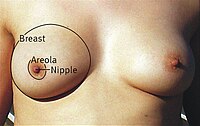
Photo from wikipedia
We assessed the associations between changes in total and abdominal fat and changes in biomarkers for breast cancer risk using data of the SHAPE-2 trial. In the SHAPE-2 trial, 243… Click to show full abstract
We assessed the associations between changes in total and abdominal fat and changes in biomarkers for breast cancer risk using data of the SHAPE-2 trial. In the SHAPE-2 trial, 243 postmenopausal overweight women were included. The intervention in this trial consisted of 5-6 kg weight loss either by diet only or exercise plus diet. After 16 weeks, we measured serum sex hormones, inflammatory markers, total body fat (measured by DEXA scan) and intra and subcutaneous abdominal fat (measured by MRI). Associations between changes in different body fat depots and biomarkers were analysed by linear regression using the study cohort irrespective of randomisation to make maximal use of the distribution of changes in fat measures. We found that a loss in total body fat was associated with favourable changes in free oestradiol, free testosterone, leptin and sex hormone binding globulin (SHBG). The loss of intra-abdominal fat was associated with a decrease in free testosterone, hsCRP and leptin, and an increase in SHBG. In the multivariable analysis, the best fitted models for the biomarkers free oestradiol, SHBG leptin and adiponectin included only total body fat. For free testosterone, this was subcutaneous abdominal fat, and for hsCRP and IL-6, only intra-abdominal fat change was important. For IL-6 and adiponectin, however, associations were weak and not significant. We conclude that, in our population of healthy overweight postmenopausal women, loss of fat at different body locations was associated with changes in different types of biomarkers, known to be related to risk of breast cancer.
Journal Title: Endocrine-related cancer
Year Published: 2017
Link to full text (if available)
Share on Social Media: Sign Up to like & get
recommendations!